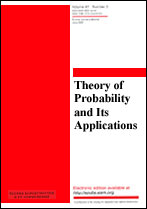|
This article is cited in 3 scientific papers (total in 3 papers)
Short Communications
Randomized Optimal Stopping Times for a Class of Stopping Games
V. C. Domansky
St. Petersburg Institute for Economics and Mathematics, Russian Academy of Sciences
Abstract:
In Dynkin's formulation [Dokl. Akad. Nauk, 185 (1969), pp. 16–19 (in Russian)] of the stopping game problem, two players observe sequential states of a homogeneous Markov chain. Each player can stop it at any stage. When the chain is stopped, the game ends and player 1 receives from player 2 the sum depending on the player who stopped the chain and on its state at the moment of stopping.
Here we consider stopping games for the chain with the state space being the set of nonnegative integers. For the state $n>0$, the only possible transitions are either into the state $n+1$ or into the absorbing state 0 with zero payoffs (the break of the chain). The payoffs are defined so that the optimality equations have no solutions with use of pure strategies only. We obtain the solutions for these games with use of randomized stopping times. The qualitative characteristics of solutions are determined with the limiting behavior of payoffs.
Keywords:
Markov chains, stopping times, matrix games, optimal strategies, values of games.
Received: 21.03.2000
Citation:
V. C. Domansky, “Randomized Optimal Stopping Times for a Class of Stopping Games”, Teor. Veroyatnost. i Primenen., 46:4 (2001), 770–779; Theory Probab. Appl., 46:4 (2002), 708–717
Linking options:
https://www.mathnet.ru/eng/tvp3823https://doi.org/10.4213/tvp3823 https://www.mathnet.ru/eng/tvp/v46/i4/p770
|


|




 Contact us:
Contact us: Terms of Use
Terms of Use
 Registration to the website
Registration to the website Logotypes
Logotypes








 Citation in format
Citation in format 
